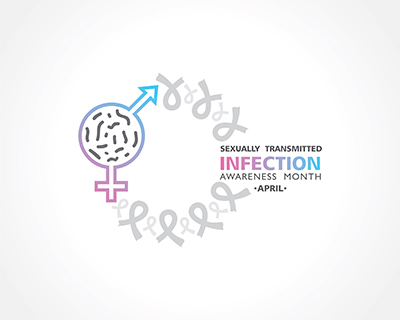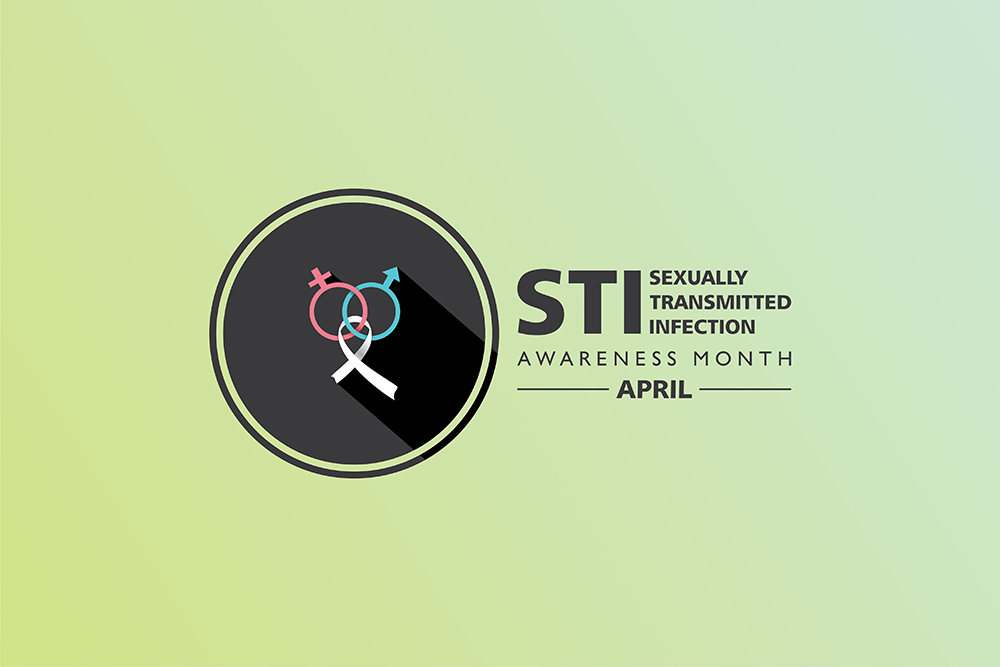
April is STI Awareness Month, a time to educate ourselves about sexually transmitted infections (STIs) and take proactive steps towards preventing their spread. STIs are a serious public health concern, with millions of new cases reported each year in the United States alone. While STIs can affect anyone who is sexually active, certain populations, such as young people, those with substance abuse disorder (SUD), people who have multiple partners, and people living with a weakened immune system due to HIV, are at higher risk.
Let’s explore what STIs are, how they are transmitted, and what steps you can take to protect yourself and your partners.
Why is STI Awareness Important?
STI awareness is important for several reasons. First and foremost, STIs are very common. According to the Centers for Disease Control and Prevention (CDC), there are approximately 20 million new cases of STIs in the United States each year. These infections can have serious health consequences, including infertility, chronic pain, and even death in some cases.
Second, many STIs are asymptomatic, which means that people can be infected and unknowingly transmit the infection to others. This is particularly true for some of the most common STIs, such as chlamydia and gonorrhea. Without regular testing and treatment, these infections can go undetected and lead to serious health complications.
Finally, STI awareness is important because it helps reduce the stigma associated with these infections. Many people feel ashamed or embarrassed about having an STI, which can prevent them from seeking testing and treatment. By promoting education and awareness, we can help reduce this stigma and encourage people to seek the care they need.
What Are STIs?
Sexually transmitted infections are infections that are spread through sexual contact, including vaginal, anal, and oral sex. There are dozens of different STIs, each with its own symptoms and health implications.
Some of the most common STIs include:
-
- Chlamydia: Chlamydia is a bacterial infection that can be transmitted through vaginal, anal, or oral sex. It is the most common bacterial STI in the United States, with an estimated 1.7 million new cases each year. Symptoms of chlamydia can include discharge from the vagina or penis, pain or burning during urination, and pain or bleeding during sex.
-
- Gonorrhea: Gonorrhea is another bacterial infection that can be transmitted through vaginal, anal, or oral sex. It is the second most common bacterial STI in the United States, with an estimated 555,608 new cases each year. Symptoms of gonorrhea can include discharge from the vagina or penis, pain or burning during urination, and pain or bleeding during sex.
-
- Human Papillomavirus (HPV): HPV is a viral infection that can be transmitted through vaginal, anal, or oral sex. There are more than 100 different strains of HPV, some of which can cause genital warts or lead to cancer of the cervix, anus, or throat. Many people with HPV have no symptoms, which is why regular testing is so important.
-
- Herpes: Herpes is a viral infection that can be transmitted through vaginal, anal, or oral sex. There are two types of herpes: herpes simplex virus type 1 (HSV-1), which usually causes cold sores around the mouth, and herpes simplex virus type 2 (HSV-2), which usually causes genital herpes. Symptoms of herpes can include blisters or sores around the mouth or genitals, itching or burning before the blisters appear, and flu-like symptoms.
-
- Syphilis: Syphilis is a bacterial infection that can be transmitted through vaginal, anal, or oral sex. It is less common than some other STIs, but its incidence has been on the rise in recent years. Symptoms of syphilis can include a painless sore or rash on the genitals, mouth, or anus, as well as fever, fatigue, and swollen lymph nodes. If left untreated, syphilis can cause serious health problems, including damage to the brain, heart, and other organs.
-
- HIV/AIDS: HIV (Human Immunodeficiency Virus) is a viral infection that attacks the immune system. It is primarily transmitted through unprotected sex, sharing needles or other injection equipment, or from mother to child during pregnancy, childbirth, or breastfeeding. HIV can lead to AIDS (Acquired Immune Deficiency Syndrome), which is a more advanced stage of the disease that can result in life-threatening infections and cancers. Symptoms of HIV can include fever, fatigue, swollen lymph nodes, and a rash.
STIs can have serious consequences for your health, including infertility, chronic pain, and an increased risk of certain cancers. In some cases, STIs can be life-threatening.
How Are STIs Transmitted?
STIs are spread through sexual contact, which can include:
-
- Vaginal sex
-
- Anal sex
-
- Oral sex
-
- Skin-to-skin contact
Many STIs can be transmitted through unprotected sex, but some, like herpes and HPV, can also be transmitted through skin-to-skin contact.
STIs can be passed from person to person even if there are no visible symptoms. This means that you can still get an STI even if your partner appears healthy.
Preventing STIs
The best way to prevent STIs is to practice safe sex. This means using condoms or other barrier methods, such as dental dams, during all sexual activity.
Here are some other steps you can take to protect yourself and your partners from STIs:
-
- Get tested regularly
Getting tested for STIs on a regular basis is an important part of STI prevention. Many STIs can be asymptomatic, which means that you may have an infection without knowing it. Getting tested regularly can help you catch infections early and get treatment if necessary.
-
- Use condoms correctly and consistently
Condoms are an effective way to prevent the spread of STIs, but they must be used correctly and consistently to be effective. Make sure you know how to use condoms correctly and use them every time you have sex.
-
- Limit your number of sexual partners
Having multiple sexual partners increases your risk of getting an STI. Limiting your number of sexual partners can help reduce your risk.
-
- Talk to your partner(s) about STIs
Having open and honest conversations about STIs with your partner(s) is an important part of STI prevention. Talk about your sexual histories, get tested together, and discuss ways to protect yourselves.
-
- Avoid sharing sex toys
Sharing sex toys can increase your risk of getting an STI. If you do use sex toys, make sure to clean them thoroughly between uses.
Treatment for STIs
The treatment for STIs depends on the type of infection. Some STIs, such as chlamydia, gonorrhea, and syphilis, can be treated with antibiotics. These antibiotics are usually taken orally, and the treatment course may last for several days to a few weeks, depending on the infection’s severity. It is essential to complete the full course of antibiotics as prescribed to ensure that the infection is entirely eradicated.
Antiviral medications can be used to treat some viral STIs, such as genital herpes, human papillomavirus (HPV), and HIV. Antiviral medications can help to reduce the severity and duration of symptoms, as well as the risk of transmitting the infection to others.
In some cases, STIs can cause long-term health problems that require ongoing treatment. For example, genital herpes can cause recurring outbreaks that require antiviral medication to manage. HIV infection requires lifelong antiretroviral therapy to suppress the virus and prevent the development of AIDS.
It is also important to inform sexual partners if you have been diagnosed with an STI. This can help prevent the spread of infection and allow partners to get tested and treated if necessary. Some STIs, such as gonorrhea and chlamydia, require partners to be treated simultaneously to prevent re-infection.
Prompt and effective treatment of STIs is essential for both individual and public health. If you suspect you have an STI, seek medical attention as soon as possible. Remember that many STIs are treatable with antibiotics or antiviral medications, and it is crucial to complete the full course of treatment as prescribed. Don’t be afraid to talk to your healthcare provider about any concerns or questions you may have about STIs and their treatment.
STI Myths and Misconceptions
There are many myths and misconceptions about STIs that can prevent people from getting the care they need. Here are some common myths about STIs:
Myth #1: Only promiscuous people get STIs.
This is a common myth that implies that only people who engage in sexual activities with multiple partners are at risk of contracting STIs. However, anyone who is sexually active can get an STI, regardless of how many partners they have had. STIs do not discriminate based on the number of sexual partners someone has had, and anyone who is sexually active is at risk of contracting an STI.
Myth #2: You can’t get an STI if you use a condom.
While condoms are effective at reducing the risk of contracting some STIs, they are not foolproof. Condoms can break or slip off, and they do not provide complete protection against all STIs. Some STIs, such as herpes and HPV, can be transmitted through skin-to-skin contact, which means that a condom may not provide adequate protection.
Myth #3: You can tell if someone has an STI just by looking at them.
Many STIs have no visible symptoms, which means that someone can have an STI without knowing it. In fact, many people with STIs do not experience any symptoms at all. This is why it is important to get tested regularly, even if you feel fine.
Myth #4: If you have an STI, you’ll know it.
As mentioned above, many STIs have no visible symptoms, which means that someone can have an STI without knowing it. Some common STIs, such as chlamydia and gonorrhea, can cause symptoms such as discharge and pain during urination, but others, such as HIV, may not cause any symptoms for years.
Myth #5: STIs are only transmitted through vaginal sex.
STIs can be transmitted through any kind of sexual activity, including oral and anal sex. Some STIs, such as herpes and HPV, can also be transmitted through skin-to-skin contact. It is important to use protection during all sexual activities to reduce the risk of contracting an STI.
Myth #6: STIs are only a problem for young people.
STIs can affect anyone, regardless of their age. While young people may be more likely to engage in risky sexual behaviors, anyone who is sexually active can get an STI. In fact, rates of STIs are increasing among older adults.
How to Recognize STI Awareness Month
During the month of April, it is critical that we recognize those who are suffering from an STI and raise awareness about how to avoid contracting one for yourself or those you care about. Here are some ways you can recognize STI Awareness Month:
-
- Get tested: The best way to prevent the spread of STIs is to get tested regularly. If you are sexually active, it is recommended that you get tested at least once a year or more often if you have multiple partners.
-
- Educate yourself: Learn about different STIs, how they are transmitted, and how to protect yourself from them. Educate yourself on the symptoms of STIs and when to seek medical attention.
-
- Talk to your partner: Communication is key when it comes to sexual health. Talk to your partner about their sexual history and whether they have been tested for STIs. Make sure you both get tested before engaging in sexual activity.
-
- Practice safe sex: Use condoms or other barrier methods every time you have sex to reduce your risk of contracting an STI. Avoid sharing sex toys and practice good hygiene.
-
- Spread awareness: Share information about STI prevention and treatment with your friends, family, and social media followers. Encourage others to get tested and seek medical attention if they experience any symptoms.
By recognizing STI Awareness Month and taking steps to prevent and treat STIs, we can work towards a healthier and safer future for everyone.
MCR Health & STI Awareness Month
MCR Health is a healthcare organization that is dedicated to providing high-quality healthcare services to individuals in the communities that it serves. We recognize the importance of STI awareness and are committed to educating our patients and the community on the importance of sexual health. As such, MCR Health is proud to recognize STI Awareness Month as an opportunity to increase awareness and understanding of sexually transmitted infections and promote prevention and treatment.
During STI Awareness Month and every month, MCR Health provides educational resources and offers screenings and testing services to encourage individuals to take control of their sexual health. We understand that sexual health can be a sensitive and sometimes uncomfortable topic for some individuals, but it is essential to maintaining overall health and well-being. MCR Health is committed to creating a safe and supportive environment where patients can feel comfortable discussing their sexual health concerns and receiving the necessary care and treatment to maintain optimal health. Contact us today to schedule a screening or to discuss any concerns you may have about your sexual health.

